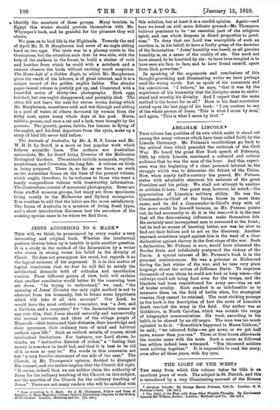ABRAHAM LINCOLN.•
THIS volume has qualities of its own which make it stand out among the many volumes which have been called forth by the Lincoln Centenary. Mr. Putnam's recollections go back to the critical time which preceded the outbreak of the Civil War. He heard the great New York speech of February, 1860, by which Lincoln convinced a cultured and critical audience that he was the man of the hour. And this experi- ence was the beginning of a close personal interest in the struggle which was to determine the future of the Union. Now, when nearly half-a-century has passed, Mr. Putnam states with admirable clearness his estimate of the great President and his policy. We shall not attempt to analyse or criticise it here. One point may, however, be noted,—the appreciation of Lincoln's military ability. He was the Commander-in-Chief of the Union forces in more than name, and he did a Commander-in-Chief's duty with all the more credit to himself because, as Mr. Putnam points out, he had necessarily to do it in the rear,—it is in the rear that all the demoralising influences make themselves felt. He certainly sent incompetent men to command at the front ; but he bad no means of knowing better, nor was he slow to find out their failure and to act on the discovery. Another reproach sometimes urged against him is the want of a clear declaration against slavery in the first stage of the war. Such a declaration, Mr. Putnam is sure, would have alienated the Border State and indefinitely postponed the victory of the Union. A special interest of Mr. Putnam's book is in the personal reminiscences, He was a prisoner at Richmond during the last winter of the war, and he uses very plain language about the action of Jefferson Davie. To imprison thousands of men whom he could not feed or keep warm—the railways could not bring food even for the troops, and the blankets had been requisitioned for army use—was an act of brutal cruelty. Such conduct is as indefensible as to massacre them on the field of battle when, for strategical reasons, they cannot be retained. The most striking passage in the book is the description of bow the news of Lincoln's death reached the army in the field. Our author was at Goldsboro, in North Carolina, which was outside the range of telegraphic communication. He went, according to his habit, to be shaved by an old negro. The man was too much agitated to do it. " Somethin's happened to Massa Linkum," he said; "we coloured folks—we get news, or we get half news, sooner than you-uns." Three or four hours afterwards the courier came with the news. Such a scene as followed has seldom indeed been witnessed. " Ten thousand soldiers were sobbing together." It is impossible to read the story, even after all these years, with dry eyes.






































 Previous page
Previous page